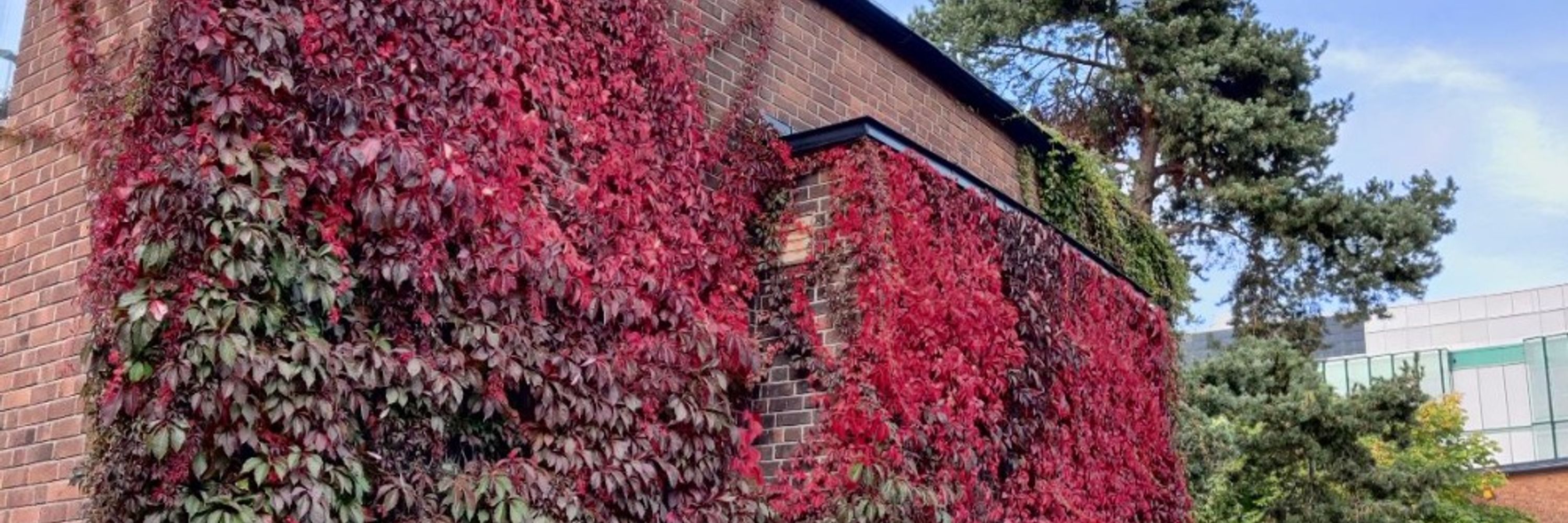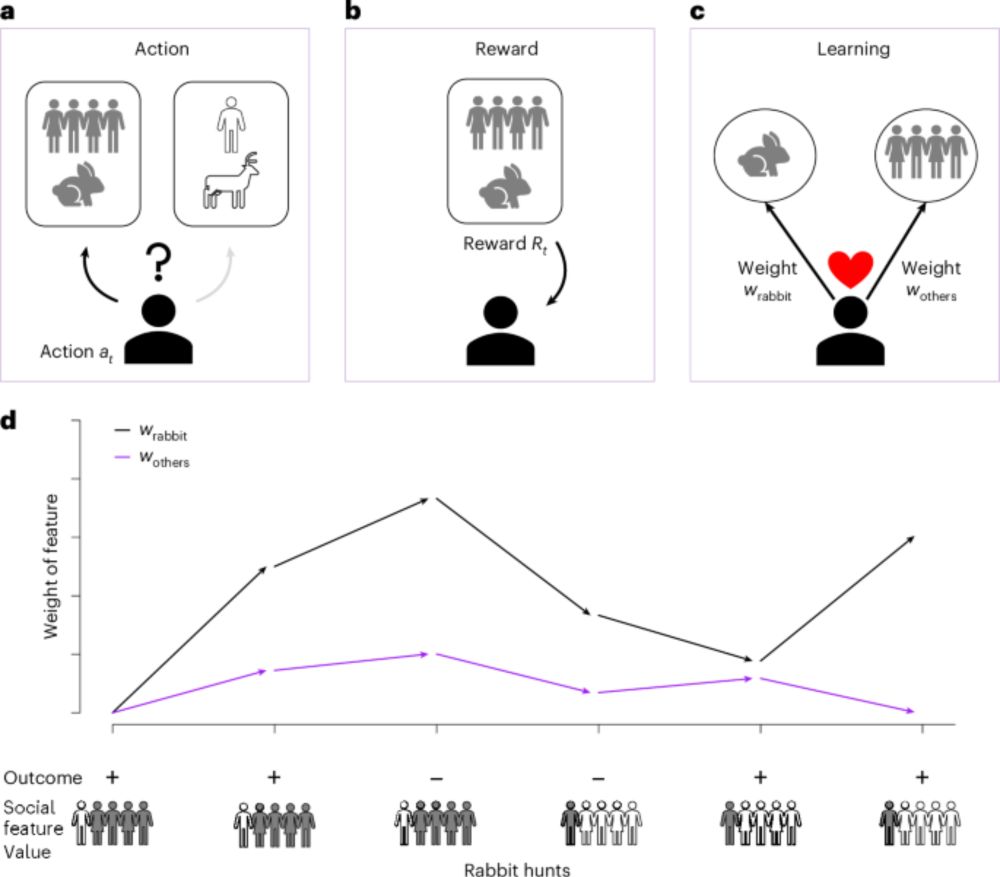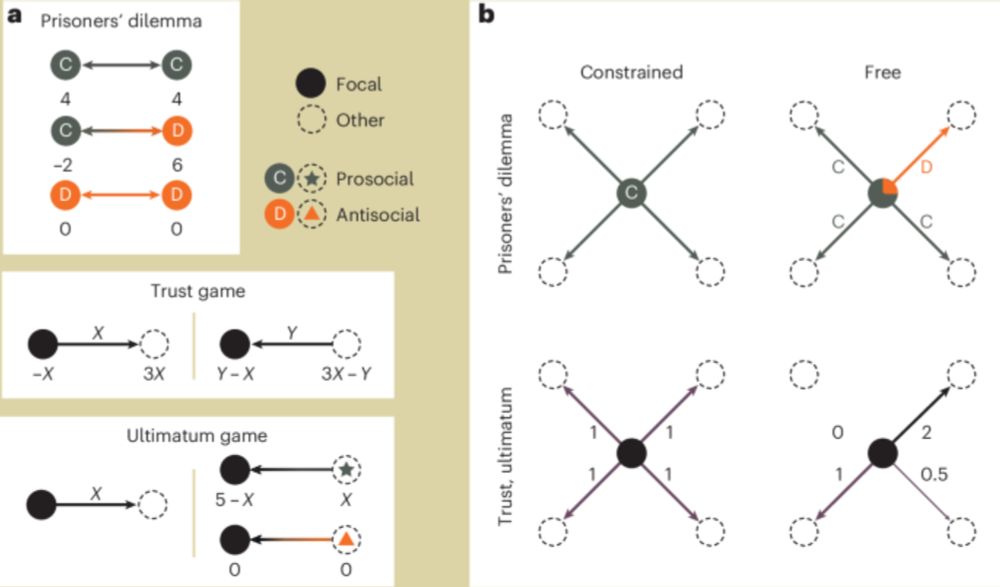
@lucasmolleman.bsky.social
www.nature.com/articles/s41...

Computational modeling of error patterns during reward-based learning show evidence that habit learning (value free!) supplements working memory in 7 human data sets.
rdcu.be/eQjLN

Computational modeling of error patterns during reward-based learning show evidence that habit learning (value free!) supplements working memory in 7 human data sets.
rdcu.be/eQjLN
"Leveraging Natural Language Processing for Data-Driven Agent-Based Modelling of Online Cultural Dynamics"
www.exeter.ac.uk/v8media/recr...
More details here:
www.exeter.ac.uk/study/fundin...
"Leveraging Natural Language Processing for Data-Driven Agent-Based Modelling of Online Cultural Dynamics"
www.exeter.ac.uk/v8media/recr...
More details here:
www.exeter.ac.uk/study/fundin...
We reason that 1) their data supports rather than rejects the sequence hypothesis, as monkeys and chimps did not perform with any precision in these sequential tasks. 7/n

We reason that 1) their data supports rather than rejects the sequence hypothesis, as monkeys and chimps did not perform with any precision in these sequential tasks. 7/n
11 November, 1pm CET
tu-dresden.de/mn/psycholog...

11 November, 1pm CET
tu-dresden.de/mn/psycholog...

Are reinforcement learning models complete accounts of decisions from experience if they ignore explicit memory?
In this new preprint, we show that people indeed form robust explicit memory representations that flexibly guide later decisions.
🔗 Preprint: doi.org/10.1101/2025...

Are reinforcement learning models complete accounts of decisions from experience if they ignore explicit memory?
In this new preprint, we show that people indeed form robust explicit memory representations that flexibly guide later decisions.
🔗 Preprint: doi.org/10.1101/2025...
osf.io/preprints/ps...
IMO, thinking about identity in an instrumental way helps explain a lot of behavior that seems otherwise baffling.
osf.io/preprints/ps...

osf.io/preprints/ps...
In it we argue that industry-driven manipulation of social media research is well underway and that norms and institutions in the field are ill-prepared to resist tech's influence.
arxiv.org/abs/2510.19894
In it we argue that industry-driven manipulation of social media research is well underway and that norms and institutions in the field are ill-prepared to resist tech's influence.
arxiv.org/abs/2510.19894
Apply by Nov 12!
Maybe of interest to folks from #COSMOS2025 or @eslr.bsky.social? Please feel free to share! 🙏
Apply by Nov 12!
Maybe of interest to folks from #COSMOS2025 or @eslr.bsky.social? Please feel free to share! 🙏
Our new preprint, led by
@anilyaman.bsky.social & @ts-brain.bsky.social
shows that semantic knowledge guides innovation and drives cultural evolution. 🧠📘 arxiv.org/abs/2510.12837

Our new preprint, led by
@anilyaman.bsky.social & @ts-brain.bsky.social
shows that semantic knowledge guides innovation and drives cultural evolution. 🧠📘 arxiv.org/abs/2510.12837
In new work led by Valerii Chirkov, we show that payoff selectivity is key in transforming a group of individuals into an intelligent collective 🤝🧠
www.youtube.com/watch?v=xY7n...
Preprint: osf.io/preprints/ps...

In new work led by Valerii Chirkov, we show that payoff selectivity is key in transforming a group of individuals into an intelligent collective 🤝🧠
www.youtube.com/watch?v=xY7n...
Preprint: osf.io/preprints/ps...

The CoDec Lab @ NYU (codec-lab.github.io) is looking for PhD students (Fall 2026) interested in computational approaches to social cognition & problem solving 🧠
Applications through Psych (tinyurl.com/nyucp) are due Dec 1. Reach out with Qs & please repost! 🙏
The CoDec Lab @ NYU (codec-lab.github.io) is looking for PhD students (Fall 2026) interested in computational approaches to social cognition & problem solving 🧠
Applications through Psych (tinyurl.com/nyucp) are due Dec 1. Reach out with Qs & please repost! 🙏
However, I have a couple of problems with it...
1/n
However, I have a couple of problems with it...
1/n

We explore the use of cognitive theories/models with real-world data for understanding mental health.
We review emerging studies and discuss challenges and opportunities of this approach.
With @yaelniv.bsky.social and @eriknook.bsky.social
Thread ⬇️

We explore the use of cognitive theories/models with real-world data for understanding mental health.
We review emerging studies and discuss challenges and opportunities of this approach.
With @yaelniv.bsky.social and @eriknook.bsky.social
Thread ⬇️
@psmaldino.bsky.social @babeheim.bsky.social
@psmaldino.bsky.social @babeheim.bsky.social
osf.io/preprints/ps...
In a sample of ~2 billion comments, social media discourse becomes more negative over time
Archival and experimental findings suggest this is a byproduct of people trying to differentiate themselves
Led by @hongkai1.bsky.social in his 1st year (!) of his PhD

osf.io/preprints/ps...
In a sample of ~2 billion comments, social media discourse becomes more negative over time
Archival and experimental findings suggest this is a byproduct of people trying to differentiate themselves
Led by @hongkai1.bsky.social in his 1st year (!) of his PhD
We ran extensive experiments to show that making the rules of some canonical economic games looser, makes people more cooperative
www.nature.com/articles/s41...

We ran extensive experiments to show that making the rules of some canonical economic games looser, makes people more cooperative
www.nature.com/articles/s41...
Prolonged Isolation is associated with an increased behavioural sensitivity to ‘Likes’ on social media.
🧵
Social media rewards are inherently social—but does posting change during social isolation, when in-person social rewards are limited?
It turns out, yes!
Prolonged Isolation is associated with an increased behavioural sensitivity to ‘Likes’ on social media.
🧵
Social media rewards are inherently social—but does posting change during social isolation, when in-person social rewards are limited?
It turns out, yes!

3 to work with me on children as agents of cultural evolution
2 to work with @drboothroyd.bsky.social on examining school-based body image interventions.
Please share and apply!
www.durham.ac.uk/departments/...
3 to work with me on children as agents of cultural evolution
2 to work with @drboothroyd.bsky.social on examining school-based body image interventions.
Please share and apply!
www.durham.ac.uk/departments/...
How do humans learn from arbitrary, abstract goals? We show that, when goal spaces can be compressed, costly working-memory processes give way to internalized reward functions, enabling efficient goal-dependent reinforcement learning. @annecollins.bsky.social arxiv.org/abs/2509.06810

How do humans learn from arbitrary, abstract goals? We show that, when goal spaces can be compressed, costly working-memory processes give way to internalized reward functions, enabling efficient goal-dependent reinforcement learning. @annecollins.bsky.social arxiv.org/abs/2509.06810

